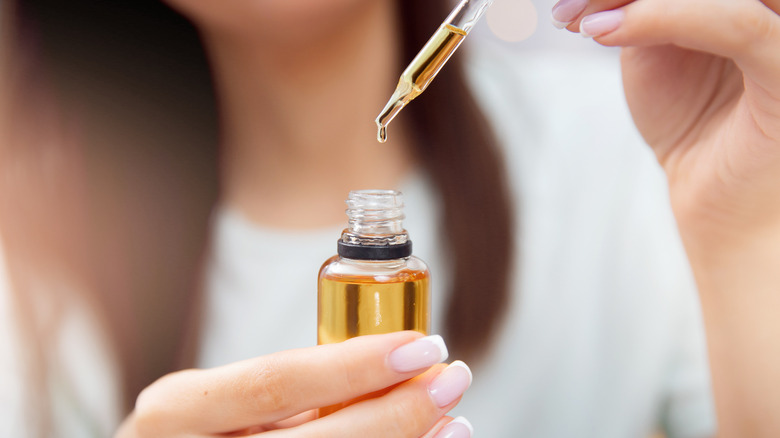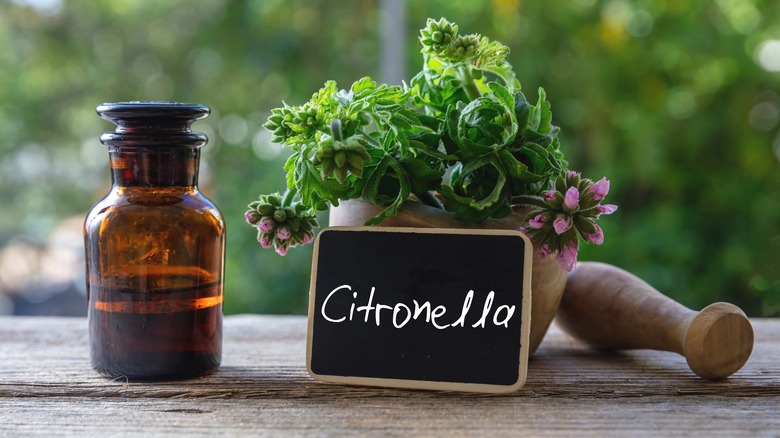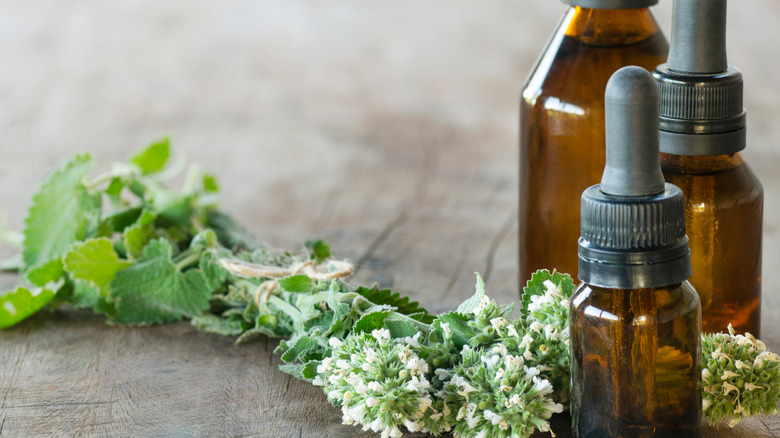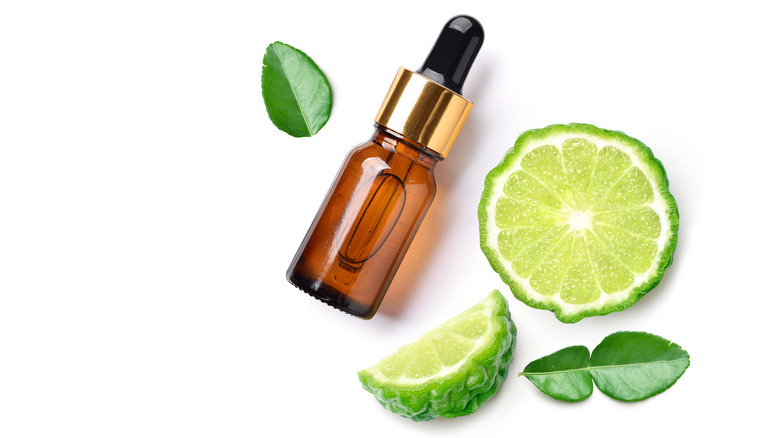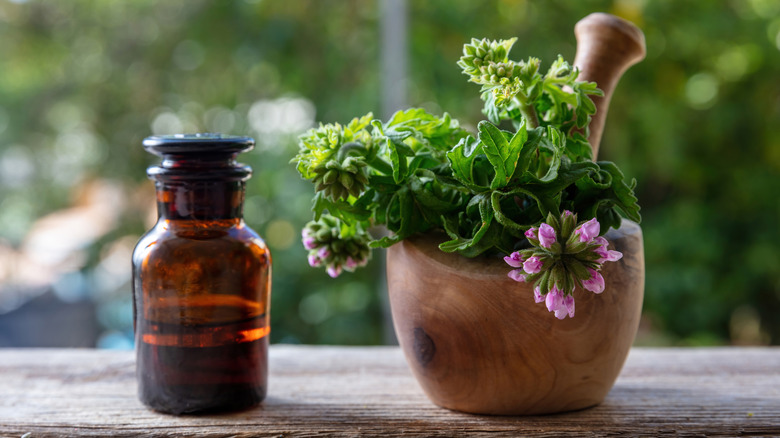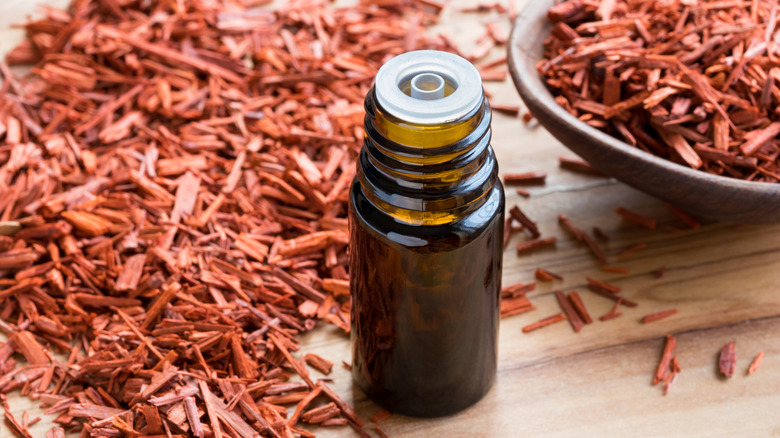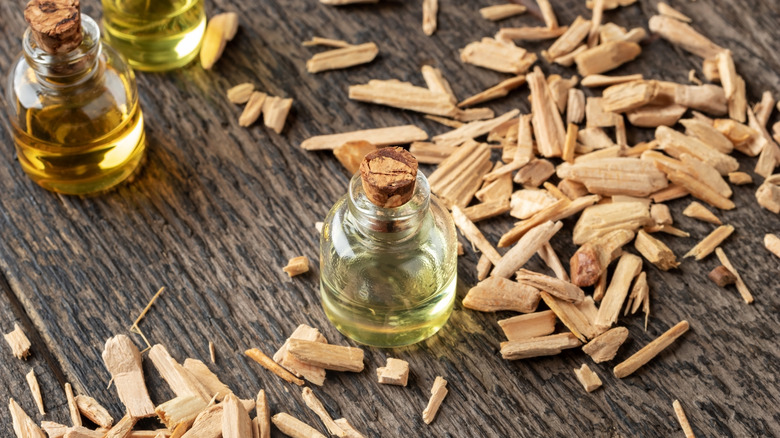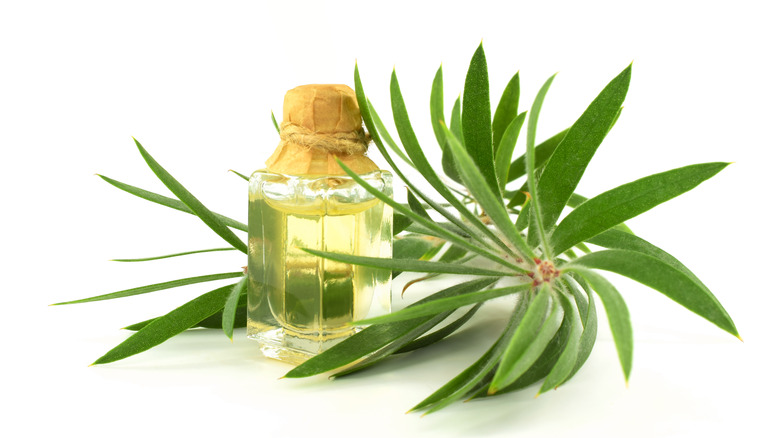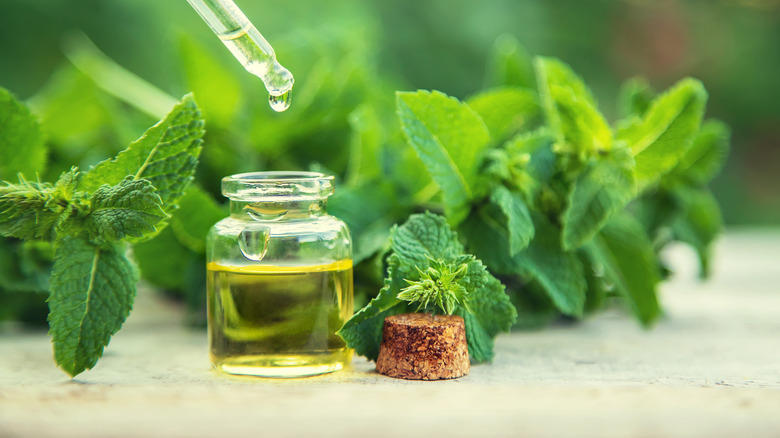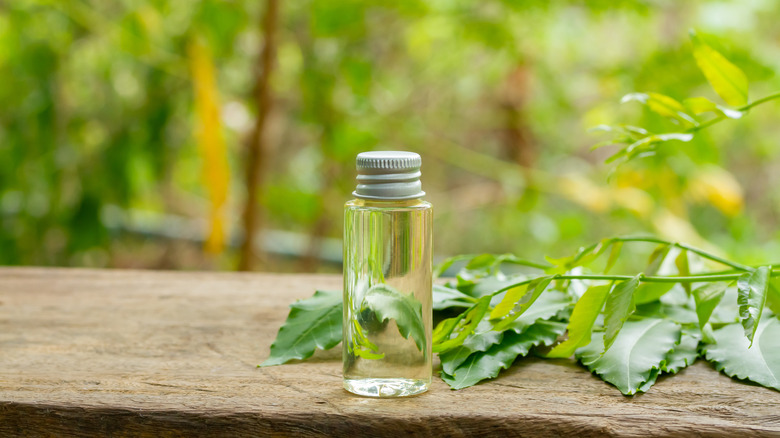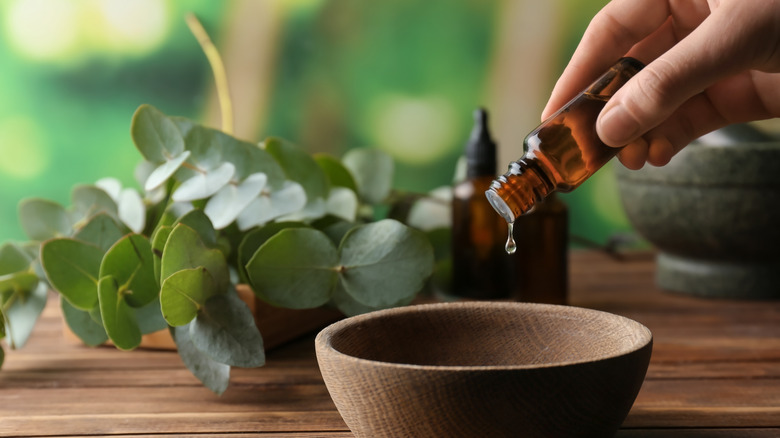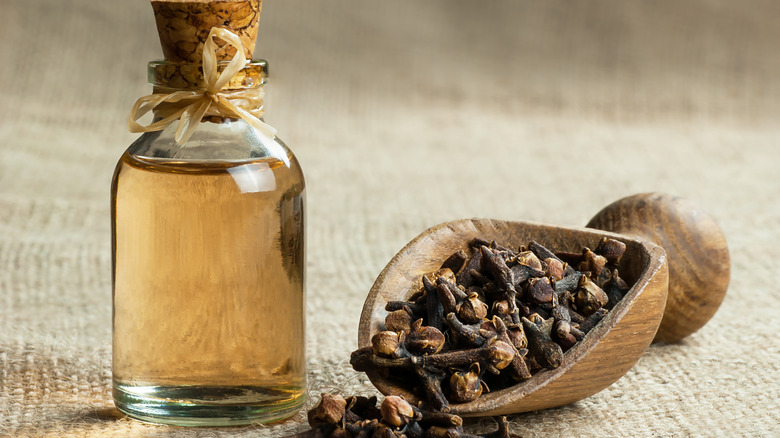How To Choose And Use The Right Essential Oils To Keep Various Types Of Pests At Bay
We may receive a commission on purchases made from links.
Essential oils are not a new solution to many household problems, such as keeping pests at bay. They've been used for thousands of years across many cultures. However, navigating the many products available and the specific instructions can be time-consuming and daunting. Certain oils must be diluted, or they can cause harm if you come into contact with them. Other oils are sure to scare away pests, but they can be harmful to household pets. Not all brands of oils should be treated equally. Various brands are more potent and pure, whereas others are highly diluted or contain fillers and won't be as effective. Finally, specific oils will deter certain types of pests and prove useless against others. Simply sprinkling a few drops around your home won't do the trick.
For example, eucalyptus might sound like a shampoo scent or a facial treatment. While the powerful, floral aroma might appeal to you, it can actually deter ticks, but won't kill them. Other oils will scare off the creepy crawlies but won't last. Understanding essential oils' various uses and ingredients will help you select the right ones for a specific pest problem. As we explore the various types of oils that are better than others, follow these tips and guidelines for using and choosing the best option. Once you have the right product, follow these tips for properly applying the oils. Say goodbye to your pest problems without the use of harmful chemicals!
Use citronella oil to deter mosquitoes, flies, and gnats
You've heard of citronella candles to keep mosquitoes away from your backyard, and possibly even considered planting citronella plants around your porch to prevent flies from buzzing. However, there's an easier solution: citronella oil. This oil is a highly concentrated extract made from distilling two plants known as Cymbopogon Nardus and Cymbopogon winterianus, which are varieties of citronella plants. The aroma is pleasant and citrusy to us, but the scent can repel pests, such as mosquitoes, flies, and gnats. The powerful smell makes it difficult for them to find their food source but does not actually kill them.
A few ways to use citronella oil is by adding a few drops to your regular candles. As the wax melts, the scent will be released. Or you can make your own citronella candles from scratch. You can also dilute the oil with a carrier oil. Pour the mixture into a spray bottle and apply it to your skin as a homemade bug repellent. Using undiluted oil on your skin can cause minor irritation, so avoid direct contact. This scent is what scares away those annoying bugs that hang out in your backyard in the summertime, which means purchasing a pure oil that doesn't contain fillers is important. Simply reapply the oil when the aroma starts to fade to keep the bugs from returning.
Use catnip oil to repel mosquitoes, bees, flies, fleas, and ticks
Catnip might sound familiar when it comes to pet toys, but the natural plant actually has some inherent pest-repellent qualities. The oil is derived from distilling a plant called Nepeta cataria, which is in the mint family and contains a natural component that can deter mosquitoes, bees, flies, fleas, and ticks. The smell is mildly floral and minty; however, it sends annoying pests in the opposite direction. Use this oil when outdoors, or if you're worried about pets tracking in unwanted bugs, such as fleas and ticks.
Catnip oil works best when it's used in your own repellent. Choose a quality oil that says 100% pure on the label. This means no artificial fragrances have been added, and the scent comes from the actual plant. Avoid labels that say "fragrance" or "aromatherapy" and lean more towards organic- and therapeutic-grade. With the right oil, you can then create a spray using witch hazel, water, carrier oil, or aloe vera. Add a few drops and apply it to your skin. You can also spray your clothes, chairs, outdoor furniture, and more to keep the bugs away. Although the oil is safe for cats and dogs, avoid using it excessively around pets as it can function as a stimulant for cats and a sedative for dogs.
Use bergamot oil to repel flies, gnats, and mosquitoes
Bergamot oil is made from the rind of a citrus fruit called Citrus bergamia. This Mediterranean fruit resembles a bumpy lime and typically grows in Italy. Once the fruit matures, the rinds are cold pressed, and bergamot oil is released and then extracted. Among several medicinal and therapeutic qualities, the oil also serves well as a non-toxic bug repellent. The refreshing citrus smell is pleasant to us, but it easily confuses smaller insects, such as flies, gnats, and mosquitoes, and sends them in the other direction.
Bergamot oil is best used as a deterrent around your home. You can mix 10-15 drops with some vinegar and spray it around the inside of your doorways and windows. Although you can apply it topically to prevent bugs from hanging around, you will want to be careful about using this product on sunny days. Bergamot oil is photo-toxic or photosensitive, meaning it can cause irritation and harm if exposed to prolonged, direct sunlight. Use this oil on overcast days diluted with a carrier or oil, or opt to apply it on surfaces rather than your skin.
Use geranium oil to avoid mosquitoes, ticks, and fleas
Geranium oil is another option that has been found to be highly effective against a variety of pests, including mosquitoes, ticks, and fleas. The oil is extracted from the flowers of a plant known as Pelargonium graveolens, which is a member of the geranium family. Many different varieties of Pelargonium can be used to create this natural insecticide. When choosing a specific brand for this particular oil, ensuring it is not a synthetic fragrance is not as important. The citrusy scent overpowers the insect's instincts and confuses them, causing them to go in a new direction.
To use geranium oil to repel pests, it can be diluted with a carrier oil and applied directly to the skin or added to a diffuser to disperse the scent. Another simple way to utilize geranium oil is to add it to your homemade or store-bought cleaning solutions. A few drops will smell great, and continually using it throughout the house will repel pests. However, avoid this oil if you have fur friends in the home, as it can be toxic to them.
Sandalwood oil repels aphids, slugs, mosquitoes, and weevils in the garden
Perhaps this is a lesser-known oil, but sandalwood not only smells fantastic, but the woodsy aroma is strong enough to repel aphids, slugs, and weevils in the garden, and it is also a natural alternative to chemical mosquito sprays. Extracted from the bark of trees in the Santalum album and spicatum species, sandalwood oil has been known for centuries for its various uses — therapeutic, traditional, and medicinal. However, we all know that not all oils are created equal. To ensure maximum benefits, it is recommended to purchase high-quality, pure sandalwood oil from a reputable source mentioning the Latin name and noting the distilling process. The price will be a great indicator because it's one of the most expensive oils on the market.
When in the garden, add approximately 5-10 drops of sandalwood oil to a spray bottle diluted with water. Spray one affected plant as a test to make sure the mixture isn't too strong. If the leaves turn brown or appear yellowed, you'll need to add more water to the solution. Once you have the correct ratio, spray the solution on the affected plants every few days. For mosquitoes, apply a few drops of sandalwood oil to a palm-full of carrier oil, such as rapeseed, argan, or castor. Apply the oil to the skin, or consider sprinkling a few drops around your outdoor area to overwhelm pests. Furthermore, the woody, earthy scent can also provide a relaxing and calming atmosphere in your home and garden.
Use cedarwood oil to ward off moths
Cedarwood oil can be drawn from the wood of certain tree varieties, such as Cedrus atlantica. The naturally occurring oil produces a strong woodsy scent that specifically deters moths that hatch and chew through fabric. Throughout history, the smell of cedar has been used to prevent moths from laying their eggs in dark areas that store clothing and textiles. This is why clothing chests and wardrobes were often lined or made from cedar wood.
In the past, store owners have placed chunks of cedar wood in closets and attics to scare off harmful pests. However, with the convenience of essential oils, you can easily apply a few drops of the oil around your home. Do not apply the oil to any fabrics directly unless it is a scrap that you don't mind staining. Try adding three to six drops to a cotton ball and placing them in dresser drawers or the back of your closet. Cedar oil can also repel ticks and flies as long as the scent is strong. Add 10 to 15 drops to your bug spray or candles to take your natural remedy to another level.
Use tea tree oil to repel all sorts of common bugs
Tea tree oil is perhaps one of the most commonly known essential oils because of its long list of benefits. In addition to killing house flies and deterring bed bugs, ants, mosquitoes, ticks, fleas, bees, and more, the versatile oil is anti-bacterial and works well in cleaning products. Also known as melaleuca oil, the natural pest repellent is made when you steam the leaves of the Australian tea tree. The powerful scent confuses and scares off a variety of bugs; however, a more potent version can actually suffocate houseflies when they come into contact with the oil.
To make tea tree oil the most effective, you can create a homemade spray that can be applied directly to the skin. Mixing carrier oil and a bit of aloe vera in a spray bottle or mister is an effective method. Another way to utilize tea tree oil is to sprinkle a few drops around your doorways and outdoor areas. A few drops can be added to your tiki torches or citronella candles. Or add a few drops to a scrap of fabric or a cotton ball. You can stick these between outdoor cushions or in corners to subtly infuse the scent. Finally, for small outdoor areas such as patios or decks, you can plug your diffuser in and constantly pump tea tree oil into the surrounding area. It's not safe for dogs, though!
Use peppermint oil to banish spiders
If you despise eight-legged critters, then you'll definitely want to pick up a bottle of peppermint oil. This product is made when manufacturers distill all parts of the peppermint plant, including the flowers, stems, and leaves. The potent smell is what keeps the spiders at bay. Because these insects smell with their legs, it's easy for them to come into contact with the oil and get spooked. Using this oil can be a preventative method, or it can be used to treat a pesky spider problem in any room of your home. Look for brands that say 100% pure and do not include extenders, solvents, or fillers. A great way to identify a quality brand is to smell the oil yourself. You will quickly notice how potent a quality oil is compared to a less expensive option.
Create your very own spider spray with just a few ingredients. Find a plastic or glass spray bottle and fill it with 3 parts water and 1 part distilled white vinegar. Don't worry, the vinegar won't smell once it dries. Finish the spray by adding 15-20 drops of peppermint oil. The scent should be strong. If it is faint, add a few more drops. You can spray the mixture around your doors and windows to prevent more spiders from entering your home. However, it smells so good you'll want to spray it all over. Consider spraying under cabinets, along your trim, in corners, and throughout your closets to keep spiders from setting up camp.
Use neem oil to control plant pests
Neem oil is a longtime remedy made from the seed kernels of the Azadirachta indica tree, which is a species found in tropical regions in India and Africa. This yellowish oil has a distinct, garlic/sulfur-like odor that can really put off pests like aphids, mealybugs, whiteflies, spider mites, leafhoppers, and Japanese beetles. It even works effectively against the annoying fungus gnats that flit and fly around your home if you have house plants. Neem oil is made up of several components, such as azadirachtin, nimbin, picrin, and sialin. Out of these elements, azadirachtin is particularly responsible for repelling and killing pests.
To use neem oil in your garden or houseplants, one option includes drenching the soil of your potted plants to suffocate gnat larvae while they develop. A diluted oil solution should be applied about once every other week until you notice a decrease in gnats coming from infested pots. Don't overwater, though. Another option is to create a spray by combining a few ounces of water and neem oil. You can even double up the efficiency by adding a few drops of tea tree oil or peppermint. You can then spray the soil regularly to prevent more gnats from infesting your plants or spray your garbage disposal to keep that area clear too.
Use eucalyptus oil to confuse flies, roaches, ants, spiders, and lice
Eucalyptus is probably another name you recognize, as it was one of the oils that gained popularity in cosmetics before essential oils really took off. It's closely related to the melaleuca plant and is also part of the myrtle family. The oil is derived from steaming and distilling the stems and leaves of eucalyptus trees, which are native to Australia. The branches and leaves of the plant have such a floral, potent scent that even just steaming the leaves releases a strong aroma that is said to have health benefits, such as relieving dry skin and cold symptoms. However, the smell of the oil can also be an effective way to scare off flies and confuse the senses of other insects, such as roaches, ants, spiders, and lice.
If you're hoping to utilize eucalyptus for insect repellent, it's best to search for a product that is high quality with a powerful smell. It also helps if the eucalyptus is mixed with lemon, as it increases the effectiveness. Many shoppers who are turning to less toxic products choose to use eucalyptus as a mosquito repellent rather than traditional bug spray that smells bad and is full of harsh chemicals. A great way to use eucalyptus is to add 5-10 drops to bug-repellent bracelets. Some already contain essential oils, but you can always replenish them yourself. Keeping the oil close to your body will help scare those pesky bugs off during late summer evenings.
Clove oil can deter and kill a whole host of pests
Clove oil can be traced back to Indonesia, where the Syzygium aromaticum tree thrived in a tropical setting. For centuries, different cultures have utilized the plant and oil to treat ailments, and it's now being hailed as an excellent alternative to bug sprays and repellents that contain DEET, especially for children. The oil is derived from the plant's unopened flower buds. Once the flowers are dried, they are distilled and the oil is funneled off. The scent of clove oil is pungent and smells exactly like the flowers do. However, the chemical element known as eugenol is the thing that is responsible for the aroma. This powerful component will not just deter but quickly kill a variety of insects, such as mosquitoes, ants, wasps, moths and their larvae, flies, fleas, earwigs, silverfish, mites, aphids, cockroaches, and more.
Use a mixture of clove oil, carrier oil, and water to create a non-toxic homemade pesticide. You can feel good about spraying your home's doors, windows, and entryways with this spray as it won't cause irritation. In addition, a study revealed that a combination of 10% makaen oil and 10% clove oil was approximately 95% effective against mosquitoes for 4 to 5 hours after applying. However, it's recommended to keep this one away from pets as it can harm them.
